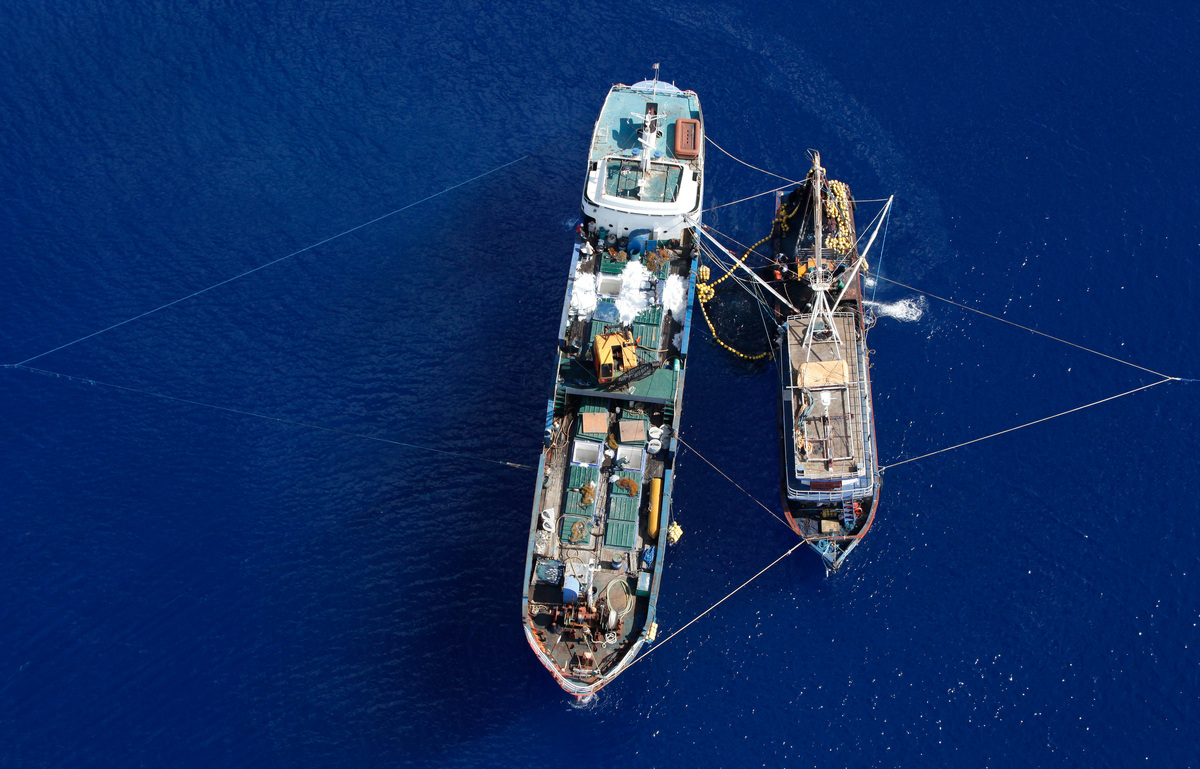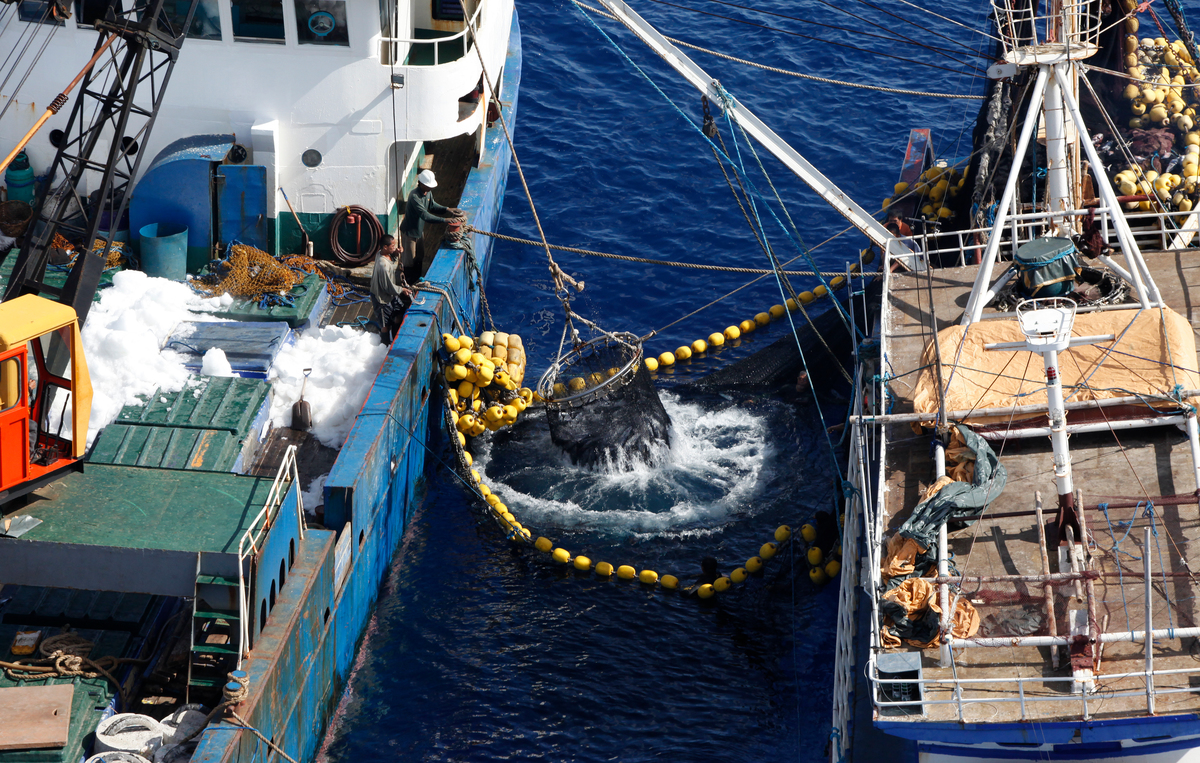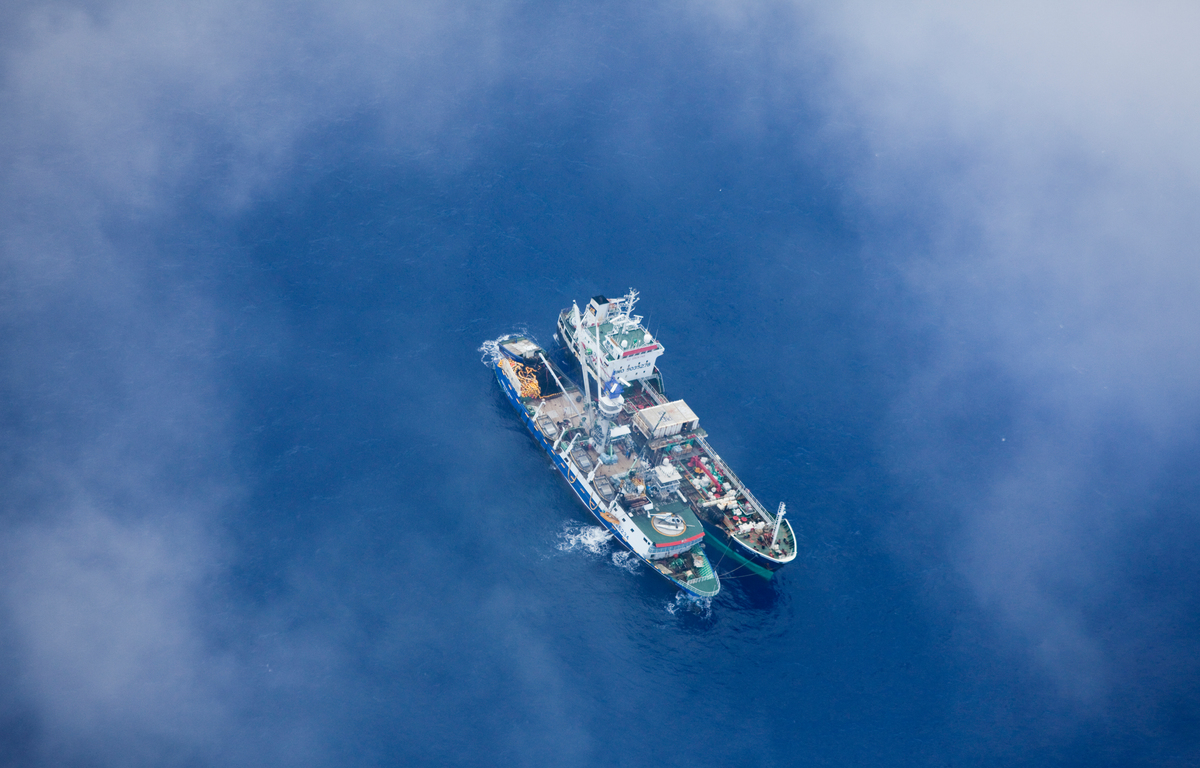
Tuna is trans-shipped from an illegal, unregistered and unlicensed (IUU) purse seine fishing vessel onto a reefer, or cold storage vessel, on the high seas, close to the border with Indonesia’s Exclusive Economic Zone (EEZ). © Alex Hofford / Greenpeace
Motherships… transshipping… they sound like things you’d find in outer space while you’re star trekking across the universe. But the Rainbow Warrior is finding them way out in the high seas, in areas of the Pacific Ocean that are more than 200 nautical miles from land, and outside the jurisdiction of any country or its laws.
On the surface, they sound pretty innocuous. Motherships are out here providing fuel and provisions to other vessels out at sea, but many of them do a whole lot more. There’s a type of mothership called a reefer, with massive refrigerated holds that are filled with the catch from smaller fishing boats. The process of moving fish from one vessel to another is called transshipping, and it lets the fishing boats work for months or years without having to go into port. The industry claims transshipping saves money, fuel and time, but recent reports recent reports have revealed that these practices are not just done for efficiency, they can be used as a way to plunder the oceans, dodge regulations, and keep fishermen as a captive workforce. They work far from land and law, often enabling labour abuse, overfishing, and illegal, unreported and unregulated fishing to continue unchecked.
Lets get this totally clear: transshipping lets fishing vessels travel half way around the world to work in the Pacific, keeping their workers isolated and their catch out of sight of authorities, sometimes for years on end, without having to go into a Pacific port once.

Illegal Purse Seine Fishing Vessel © Alex Hofford / Greenpeace
“Fishers are perceived to be particularly vulnerable to deceptive and coercive employment practices for a number of reasons. Fishing vessels, especially in the long-distance fishing fleet, can stay in remote areas of the sea for several years at a time, and transship fuel, stores, crew and fish at sea. Fishers aboard these vessels will find it difficult to report abuse, injuries, and deaths and seek assistance for their own protection.” — International Labour Office, 2013.
Recently, an exposé by Associated Press used satellite detection and photography to reveal transshipment of slave-caught fish in the waters of Papua New Guinea. If there were no motherships to take fish and provide fuel and supplies, fishing vessels would have to operate from Pacific ports, where their catches could be inspected, and crew who were suffering violence or mistreatment would have the chance of escape. Unloading in nearby ports would contribute much-needed jobs and income to the Pacific people who are seeing their oceans stripped by distant water fishing fleets.
You don’t need to take my word for this. The agencies that manage both global and regional fisheries know the risk transshipment poses to fisheries management catch data and science, as well as to the fishing industry and its workers.

Fishing Vessels in the Pacific Ocean © Greenpeace / Paul Hilton
In the Technical Guidelines for Responsible Fisheries, the United Nations Food and Agriculture Organization recommends: “To the greatest extent possible, flag states should prohibit their vessels from engaging in transshipment of fish at sea without prior authorization issued by the flag state. An even more effective approach would be to prohibit transshipment of fish at sea entirely, as some states have already done.”
Here in the Pacific, the fisheries management body requires 36 hours notice prior to transshipment on the high seas. The member country must also submit “a plan detailing what steps it is taking to encourage transshipment to occur in port in the future.” Purse seine vessels, which take over 70% of the tuna catch in this part of the Pacific, are already prohibited from transshipping at sea.
If there’s one thing we can say for sure about transshipping, we don’t know what we don’t know. Transshipment is a black hole in seafood supply chains. It enables fish laundering, and keeps dodgy practices at a deniable distance from brands, logos and reputations. For the sake of our oceans, the future of tuna, and to stop the disgraceful treatment of fisheries workers, it’s time to put an end to this practice.
It’s time to stop high seas transshipping, and get those ‘motherships’ back in the science fiction movies where they belong.
Oliver Knowles is the Tuna Global Project Leader, based at Greenpeace New Zealand.
The Greenpeace Ship Rainbow Warrior sailing into the Pacific Ocean to confront the fishing industry with a simple message: It’s time to change tuna.
Follow their progress here
Or join them on Facebook
